- Home
- Anne McCaffrey
Sassinak Page 19
Sassinak Read online
Page 19
You've got the wrong sex, Sassinak thought to herself, and you're not about to get me or my ship. She braced her wrist and fired carefully. A smoking hole appeared in one gray-armored chest.
"He's armed," said a surprised voice. "Captains don't carry—" This time she checked her computer link first, and her needler burned a hole in the speaker's helmet. Three down—and where was that Weft?
He was flattened to the overhead, trying to position a Security riot net over the two remaining, but they edged away aft, firing almost random shots at Sassinak and the Weft.
"Forget capture," Sassinak said into her helmet intercom. "Just get 'em."
The Weft made a sound no human could, and shifted, impossibly fast, onto one of the enemy. Sassinak heard the terrified shriek over her speakers, but concentrated on shooting the last one. She lay there a moment, breathless, then hauled herself up and locked the cargo lift's controls to a voice-only, bridge-crew only command. The forward guard peeked cautiously around the curve of the corridor, weapon ready. Sassinak waved, and spoke on the intercom.
"Got this bunch—you take over; I'm going back to the bridge." The Weft clinging to the dead enemy let go—reluctantly, Sassinak thought—and shifted back to human form. Inside his armor—a neat trick.
"I'll call Med," he said. On the way back through the galley and wardroom, Sassinak queried the situation below. No other group had broken out; in fact, none had reached the outer cordon, and the marines had lost only five to the twenty-nine enemy dead. Two of the enemy had thrown plasma grenades, damaging the inner hull slightly, but Engineering was on it. The marine assault team was about to enter the escort, and someone on it had signalled a desire to surrender. "And I trust that like I'd trust a gambler's dice," the marine commander said grimly.
Sassinak came back onto the bridge to find everyone helmeted and armed and as much in cover as the bridge allowed. She nodded, popped her helmet, and grinned at them, suddenly elated and ready to take on anything. Other helmets came off, the faces behind them smiling, too, but some still uncertain. Most of the consoles had red lights somewhere, blinking or steady . . . too many steady.
"Report," she said, and the reports began. With portable visual scanners, Engineering had finally gotten a view of the portside pod cluster.
"Not much left to work with," was the gruff comment. "We'll have to use the replacement stores, and we may still be one or two short."
"But we can shift again?"
"Oh, aye, if that's all you want. I wouldn't go on another chase in FTL, though, not if you want to live to see your star. It'll get us home, that's about it. And that's assuming you find us a quiet place to work. From what I hear, they're in short supply. We'll need three to five days, and that's for the pods alone. What you did to the portside docking bay is something else."
Sassinak shook her head. Engineering always thought the ship counted for more than anything else. "I didn't blow that hole," she said, well aware that a court martial might think she'd been responsible anyway.
Fire Control was next, reporting that their external shields were still operative: to normal levels except in the damaged quadrant, where they would hold off minor weapons, and offer partial protection from larger ones. Their own distance weapons were in good shape, although the detection and ranging systems on the port side were not. "Soon as we can get someone outside, we can rig something on the midship vanes, and link it to the portside battle computers—except the one that got holed, of course."
Nav reported that they were almost out of LOS of the oncoming ships from the planet. "They only had a two minute window, and apparently were afraid of hitting their own ship: they didn't fire, and they won't be in position for the next five hours." Sassinak grimaced. Five hours wasn't enough for any of the repairs, except—maybe—rigging the detector lines. And she still didn't know how the fight for the escort was coming.
Just then the marine commander came on line, overriding another report. "Got it," he said. "And they didn't get word off, either: we had to blow a hole in the bow, and they're all dead—nobody to question—" Sassinak didn't really care about that, not now. She didn't want to worry about prisoners on board. "You wouldn't believe this ship," he went on. "Damn thing's stuffed with weaponry and assault gear: like a miniature battle platform. Most of the crew travels in coldsleep: that's how they did it."
"Anything we need?" she asked, interrupting his recital. "Never mind—I'll patch you to Engineering and Damage Control: if they've got components we can use, take 'em . . . then clear the ship. Twenty minutes."
"Aye, captain." Med was next: eighteen wounded, including the man who'd been with Sass, and the Weft she'd thought was dead. Its central ring and one limb were still together, and Med announced smugly that Wefts could regenerate from that. Minor ring damage, but they'd sewn it up and put the whole thing in the freezer. Sassinak shivered, and glanced around to see if the other Weft had come back in yet. No. She looked at the bridge chronometer, and stared in disbelief. All that in less than fifteen minutes?
Chapter Eleven
By the grace of whatever gods ruled this section of space, they had a brief respite, and Sassinak intended to make the most of it. She had the grain of an idea that might work to buy them still more time. Now, however, her crew labored to dismantle the escort's docking bay hatch—although not as large as their own, it could form part of the repair far more quickly than Engineering could fabricate a complete replacement. Another working party picked its way along the Zaid-Dayan's outer hull, rigging detector wires and dishes to replace the damaged portside detectors. Inside the cruiser, the marines hauled away the battered remains of the enemy assault pods, and stacked the corpses near the docking bay. That entire quadrant remained in vacuum.
Red lights began to wink off on consoles in the bridge. A spare targeting computer came online to replace the one destroyed by a chance shot, a minor leak in Environmental Systems was repaired without incident, and Engineering even found that a single portside pod could deliver power—it had merely lost its electrical connection when the others blew. One pod wasn't enough to do much with, but everyone felt better nonetheless.
One hour into the safe period, Sassinak confirmed that the escort vessel had been stripped of everything Engineering thought they might need, and was empty, held to the cruiser by their tractor field.
"This is what I want to do," she explained to her senior officers.
"It'll stretch our maneuvering capability," said Hollister, frowning. "Especially with that hole in the hull—"
"The moon's airless—there's not going to be any pressure problem," said Sass. "What I want to know is, have we got the power to decelerate, and has anyone seen a good place to go in?"
Bures, the senior Navigation Officer, shrugged. "If you wanted a rugged little moon to hide on, this one's ideal. Getting away again without being spotted is going to be a chore—it's open to surveillance from the ground and that other moon—but as long as we don't move, and our stealth gear works?" Sassinak glanced at Hollister.
"That's all right—and it's the first time I've been happy with it where it is."
"—Then I can offer any patch of it," said Bures. "—the only thing regular about it is how irregular it is. And yes, before you ask, our surface systems are all functional."
The next half hour or so was frantic, as working parties moved the enemy corpses and attack pods into the escort—along with escape modules from the cruiser, a Fleet distress beacon and every bit of spare junk they had time to shift. Not all would fit back in, and cursing crewmen lashed nets of the stuff to the escort's hull. Deep in the escort's hull and among the wreckage in its docking bay, they placed powerful explosive charges. Last, and most important, the fuses, over whose timing and placement Arly fussed busily. Finally it was all done, and the cruiser's tractor field turned off. The Zaid-Dayan's insystem drive caught hold again, easing the cruiser away from the other ship, now a floating bomb continuing on the trajectory both ships had shared. The cruiser dec
elerated still more, pushing its margin of safety to get to the moonlet's surface before any of the pursuit could come in sight.
It was only then that Sassinak remembered that Huron's navigational computer, on the transport, was still slaved to the Zaid-Dayan's. She dared not contact him—had no way to warn him that the violent explosion about to occur was not the mutual destruction of two warships. The Fleet beacon would convince him—and he was not equipped to detect that the Zaid-Dayan's tiny IFF was not in the wreckage—only a Fleet ship could enable that. She looked at the navigational display—there, still boosting safely away, was the transport. She tapped the Nav code, and said, "Break Huron's link."
A startled face looked back at her. "Omigod. I forgot. " Bures's thumb went down on the console and the coded tag for Huron's ship went from Fleet blue to black neutral.
"I know. So did I—and he's going to think the worst, unless it occurs to him that the link went quite a while first."
On the main screen, the situation plot showed the cruiser's rapid descent to the moon's surface. Navigation were all busy, muttering cryptic comments to one another and the computer; Helm stared silently at the steering display, with Engineering codes popping up along its edges: yellow, orange, and occasionally red. Sassinak called up a visual, and swallowed hard. She'd wanted broken ground, and that's exactly what she saw. At least the radar data said it was solid, and the IR scan said it had no internal heat sources.
They were down, squeezed tight as a tick between two jagged slabs on the floor of a small crater, within eight seconds of Nav's first estimate. Given the irregularity of the moon, this was remarkable, and Sassinak gave Nav a grin and thumbs-up. Ten seconds later, the escort blew, a vast pulse of EM, explosion of light, fountains of debris of every sort. And on the outward track, the Fleet distress beacon, screaming for help in every wavelength the designers could cram into it.
"That had me worried," Hollister admitted, grinning, as he watched it. "If that damn thing had blown this way, they might have decided to come get it and shut it off. I had it wired to the far side, but still—"
"The gods love us," said Sass. She looked around, meeting all their eyes. "All right, people, we've done it so far: now we'll be hiding out silently for awhile, until they're convinced. Then repairs. Then I suppose we'd better explain to Fleet that we weren't actually blown away." They looked good, on the whole, she thought: still tense, but not too stressed, and confident. "Full stealth," she said, and they moved to comply, switching off nonessential systems, and powering up the big gray canisters amidships to do whatever they did however they did it.
There was still the matter of the person who caused the first disturbance, and Sassinak wondered why more trouble hadn't surfaced during the fight. Surely that would have been the perfect time . . . unless she'd sent the subversive off with Huron, part of the boarding party. Her heart contracted. If she had—if he didn't know, if he were killed because—she shook her head. No time for that. Huron had his own ship; he'd deal with it. She had to believe he could do it—and besides, she hadn't any choice. Here, though—what about that cargo lift?
She called Major Currald, the marine commander, and asked who had been assigned to secure the cargo lift when they cordoned the area.
"Captain, it's my fault. I didn't give specific orders—"
She looked at his broad face in the monitor. Subversive? Saboteur? She couldn't believe it, not with his record and the way he'd handled the rest of the engagement. If he'd slipped much, the enemy would have won. "Very well," she said finally. "I'm holding a briefing in my quarters after the overpass—probably about four hours—we're going to need your input, too."
So. The cargo lift could be pure accident, or "Once is accident, twice is coincidence, and three times is enemy action." That reminded her to take it off bridge voice command, now that the fight was over. Once could be enemy action, too.
Sassinak had taken what precautions she could to ensure that only a few senior officers had access to controls for exterior systems. If her bridge crew wanted to sabotage her, there was really no way to prevent it. Now, with the ship on full stealth routine, all they could do was wait as the enemy's ships appeared, and see if they accepted the evidence of a fierce and fatal struggle. Every kind of debris they might expect to find was there, and surely none of them had any idea what, precisely, the Zaid-Dayan was. They would not know what total mass to expect. Besides, that Fleet beacon screeching its electronic head off was not the sort of thing a live captain wanted reporting on his or her actions. She winced, thinking of what would happen when its signal finally reached a Fleet relay station, if she hadn't managed to get word through on a sublight link earlier. She had better have a whole ship, and a live crew, and a good story to tell.
In the meantime, they had another hour and a bit to wait until the first of the enemy ships came into scan. Miserable as it was, they should stay in their protective gear until it was obvious that the enemy had accepted the scam. Not that a suit would really keep anyone alive long on that moonlet, but—
"Coffee, captain?" Sassinak glanced around, and smiled at the steward with a tray of mugs. She was, she realized, feeling the letdown after battle. She waved him toward the rest of the bridge crew. They could all use something. But she had something better than coffee . . . a private vice, as Abe had called her leftover sweet tooth. She always kept some in her emergency gear, and this was just the time for it . . . chocolate, rare and expensive. And addictive, the medical teams said, but no worse than coffee. She left her mug cooling on the edge of her console as the thin brown wedge went into her mouth. Much better. As they waited, the crew settled again to routine tasks, and Sassinak assessed their mood. They had gained confidence—she liked the calm but determined expressions, the clear eyes and steady voices. Most of the bridge crew made an excuse to speak to her; she sensed their approval and trust.
The first enemy vessel appeared on scan, high and fast, a streak across their narrow wedge of vision. It continued with no visible sign of burn or course change; the computer confirmed. Another, lower, from the other side, followed within an hour. This one flooded the moonlet with targeting radar impulses . . . which the Zaid-Dayan passively absorbed, analyzed, and reflected as if it were just another big rock. Over the next couple of hours, three more of the small ships crossed their scan; none of them changed course or showed any interest in the moon.
"I don't expect any of them carrying the fuel to hang around and search," said Hollister. "If they were going to, they'd have to get into a stable orbit—which this thing doesn't encourage."
"And I'm glad of it." Sassinak stretched. "Gah! I can't believe I'm stiff after that little bit of running—"
"And getting shot at. Did you know your back armor's nearly melted through?"
So that had been the hotspot she'd felt. "Is it? And I thought they'd missed. Now—do you suppose that other escort is going to show up—and if it is, do they have it crammed with as much armament?"
"Yes, and yes, but probably not for another couple of hours. The little ships will have told them about the explosion. Wish we could pick up their transmissions."
"Me, too. Unfortunately, they don't all speak Standard, or anything close to it."
Finally, the steward came again to pick up the dirty mugs, and gave Sassinak a worried look. "Anything wrong, captain?"
"No—thanks for the thought. I just indulged my taste for chocolate instead. Tell you what—I'm briefing the senior officers in my office in—" she looked at the chronometer, "—about fifteen minutes. Why don't you bring a pot of coffee in there, and something to eat, too. We'll be there awhile." The steward nodded and left. Sassinak turned to the others. "Bridge crew, you can get out of armor, if you want: have your reliefs stand by in case. Terrell—" This to her new Executive Officer, a round-faced young man.
"Yes, captain?"
"Take the bridge, and tell the cooks to serve the crew coffee or some other stimulant at their duty stations. As soon as we're sure that
cruiser isn't onto us, we'll stand down and give everyone a rest, but not quite yet. I'll be in my office, but I'm going to the cabin first." Sassinak went aft to her cabin, got out of the armored suit, and saw that the beam had charred a streak across her uniform under it. Grimacing, she worked it off her shoulder, and peered at the damage in her mirror. A red streak, maybe a couple of blisters; she'd peel a little, that was all. It didn't hurt, really, although it was stiffening up. She grinned at her reflection: not bad for forty-six, not bad at all. Not a silver strand in that night-dark hair, no wrinkles around the eyes—or anywhere else, for that matter. Not for the first time she shook her head at her own vanity, ducked into the stall, and let the fine spray wash away sweat and fatigue. A clean, unmarked uniform, a quick brush to her curly hair, and she was ready to face the officers again.
In her office, her senior officers waited; she saw by their faces that they appreciated this effort: nothing could be too wrong if the captain appeared freshly groomed and serenely elegant. Two stewards had brought a large pot of coffee and tray of food: pastries and sandwiches. Sassinak dismissed the stewards, with thanks, and left the food on the warmer.

 The Renegades of Pern (dragon riders of pern)
The Renegades of Pern (dragon riders of pern)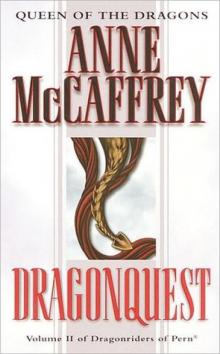 Dragonquest
Dragonquest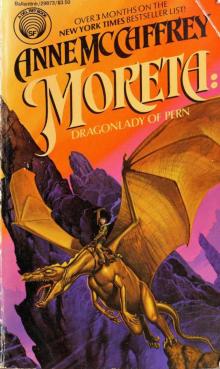 Moreta (Dragonlady of Pern)
Moreta (Dragonlady of Pern)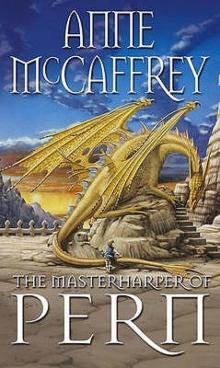 The Masterharper of Pern
The Masterharper of Pern If Wishes Were Horses
If Wishes Were Horses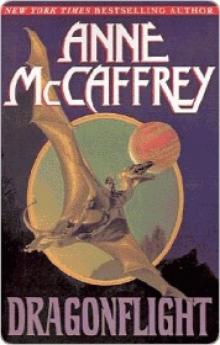 Dragonflight
Dragonflight No One Noticed the Cat
No One Noticed the Cat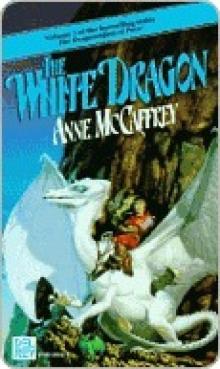 The White Dragon
The White Dragon A Gift of Dragons
A Gift of Dragons Harper Hall - Dragonsong
Harper Hall - Dragonsong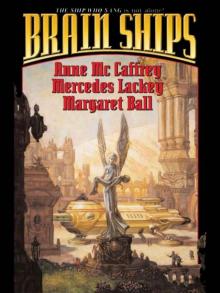 Brain Ships
Brain Ships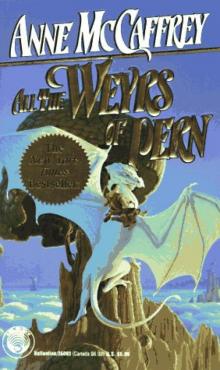 All The Weyrs of Pern
All The Weyrs of Pern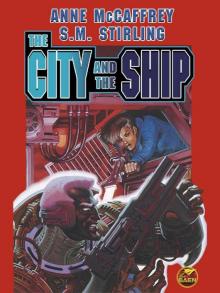 The City and the Ship
The City and the Ship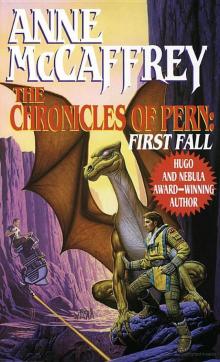 The Chronicles of Pern: First Fall
The Chronicles of Pern: First Fall Acorna’s Search
Acorna’s Search Powers That Be
Powers That Be Second Wave
Second Wave Chronicles of Pern (First Fall)
Chronicles of Pern (First Fall) The Kilternan Legacy
The Kilternan Legacy Decision at Doona
Decision at Doona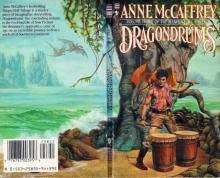 Dragondrums (dragon riders of pern)
Dragondrums (dragon riders of pern) Dragonsinger (dragon riders of pern)
Dragonsinger (dragon riders of pern) The Master Harper of Pern
The Master Harper of Pern Crystal Singer
Crystal Singer Acorna’s People
Acorna’s People Pegasus in Flight
Pegasus in Flight Sky Dragons Dragonriders of Pern
Sky Dragons Dragonriders of Pern Dragonriders of Pern 4 - Dragonsinger
Dragonriders of Pern 4 - Dragonsinger Treaty at Doona
Treaty at Doona Damia's Children
Damia's Children Stitch In Snow
Stitch In Snow The Rowan
The Rowan Dinosaur Planet
Dinosaur Planet The Year of the Lucy
The Year of the Lucy The White Dragon p-4
The White Dragon p-4 Power Lines
Power Lines Catacombs
Catacombs Moreta
Moreta Dragonsinger
Dragonsinger Crystal Line
Crystal Line The Renegades of Pern
The Renegades of Pern Moreta - Dragonlady of Pern p-8
Moreta - Dragonlady of Pern p-8 Deluge
Deluge The Skies of Pern
The Skies of Pern Acorna's Quest
Acorna's Quest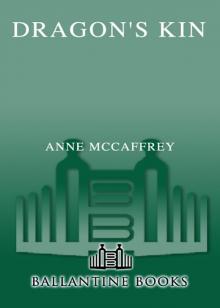 Dragon's Kin
Dragon's Kin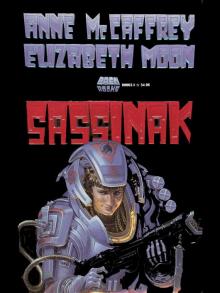 Sassinak
Sassinak![Crystal Universe - [Crystal Singer 03] - Crystal Line Read online](http://i1.bookreadfree.com/i1/03/31/crystal_universe_-_crystal_singer_03_-_crystal_line_preview.jpg) Crystal Universe - [Crystal Singer 03] - Crystal Line
Crystal Universe - [Crystal Singer 03] - Crystal Line Freedom's Landing
Freedom's Landing Acorna’s Quest
Acorna’s Quest Masterharper of Pern
Masterharper of Pern Restoree
Restoree Dolphins of Pern
Dolphins of Pern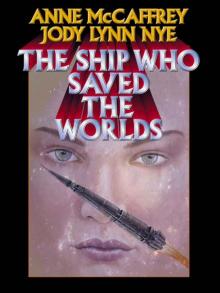 The Ship Who Saved the Worlds
The Ship Who Saved the Worlds Acorna's Triumph
Acorna's Triumph Acorna's Rebels
Acorna's Rebels![[Acorna 08] - First Warning: Acorna's Children (with Elizabeth Ann Scarborough) Read online](http://i1.bookreadfree.com/i1/04/06/acorna_08_-_first_warning_acornas_children_with_elizabeth_ann_scarborough_preview.jpg) [Acorna 08] - First Warning: Acorna's Children (with Elizabeth Ann Scarborough)
[Acorna 08] - First Warning: Acorna's Children (with Elizabeth Ann Scarborough)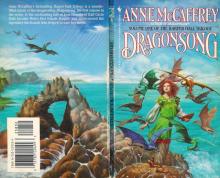 Dragonsong (dragon riders of pern)
Dragonsong (dragon riders of pern) Dragonriders of Pern 6 - Dragondrums
Dragonriders of Pern 6 - Dragondrums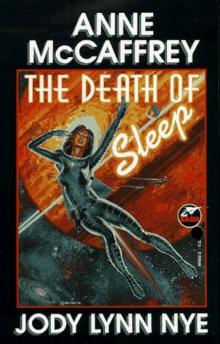 The Death of Sleep
The Death of Sleep Crisis On Doona
Crisis On Doona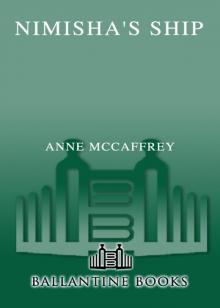 Nimisha's Ship
Nimisha's Ship Black Horses for the King
Black Horses for the King Changelings
Changelings Freedom's Choice
Freedom's Choice The Lady
The Lady The Coelura
The Coelura Catalyst
Catalyst The Unicorn Girl
The Unicorn Girl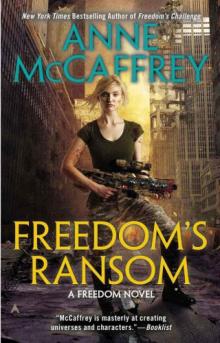 Freedom's Ransom
Freedom's Ransom Nerilka's Story
Nerilka's Story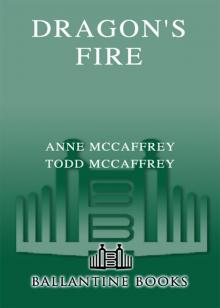 Dragon's Fire
Dragon's Fire Generation Warriors
Generation Warriors Lyon's Pride
Lyon's Pride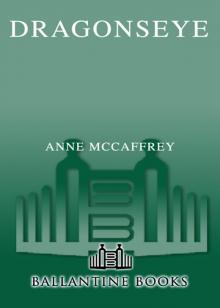 Dragonseye
Dragonseye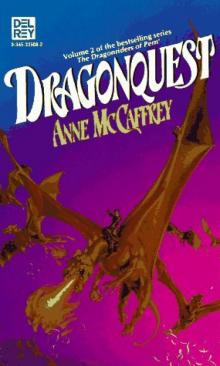 Dragon Quest
Dragon Quest Dragondrums
Dragondrums Dragonsong
Dragonsong The Mystery of Ireta
The Mystery of Ireta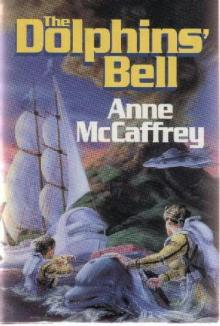 Dolphins' Bell
Dolphins' Bell To Ride Pegasus
To Ride Pegasus Power Play
Power Play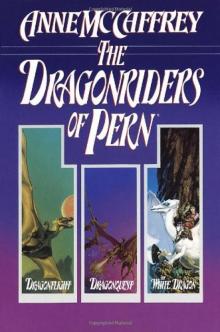 The Dragonriders of Pern
The Dragonriders of Pern An Exchange of Gifts
An Exchange of Gifts The Ship Who Sang
The Ship Who Sang Sky Dragons: Dragonriders of Pern
Sky Dragons: Dragonriders of Pern Maelstrom
Maelstrom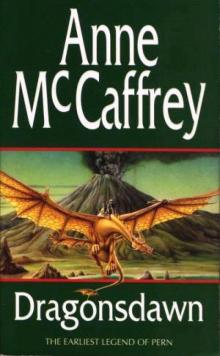 Dragons Dawn
Dragons Dawn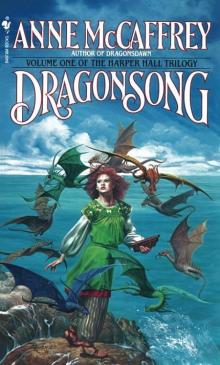 Dragon Song
Dragon Song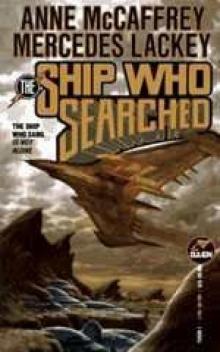 The Ship Who Searched b-3
The Ship Who Searched b-3 Damia
Damia Freedom's Challenge
Freedom's Challenge